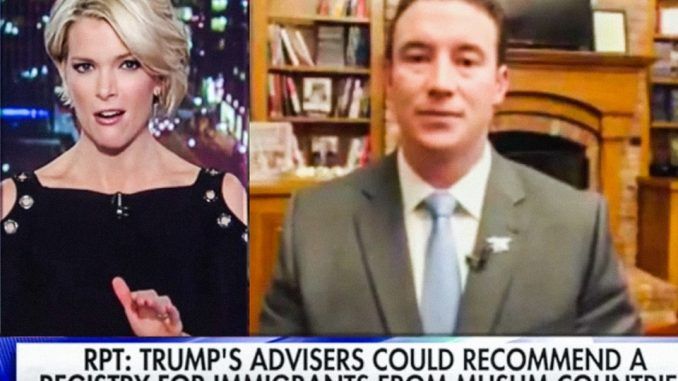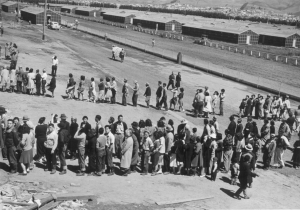
A prominent Donald Trump surrogate has suggested that the internment of Japanese Americans during world war two has set the precedent for a potential Muslim registry, as advocated by president-elect’s transition team.
 Quartz reports:
Quartz reports:
Carl Higbie, a former Navy SEAL and a spokesman for the pro-Trump Great America PAC, made the argument on Megyn Kelly’s Fox News show Wednesday (Nov. 16) night, explaining that a Muslim registry would “hold constitutional muster.”
Trump surrogates are already citing Japanese internment camps from WW II as “precedent” for Muslim registry pic.twitter.com/DVnjtom0mc
— Brendan Karet (@bad_takes) 17 November 2016

BYPASS THE CENSORS
Sign up to get unfiltered news delivered straight to your inbox.
You can unsubscribe any time. By subscribing you agree to our Terms of Use
“I know the ACLU is gonna challenge it, but I think it’ll pass, and we’ve done it with Iran back—back a while ago. We did it during World War II with Japanese, which, you know, call it what you will, maybe—,” said Higbie, before Kelly interjected.
“Come on. You’re not—you’re not proposing we go back to the days of internment camps, I hope,” asked Kelly, who continually pushed back on Higbie’s suggestion. But he held firm:
“Look, the president needs to protect America first, and if that means having people that are not protected under our constitution have some sort of registry so we can understand, until we can identify the true threat and where it’s coming from, I support it,” said Higbie.
Higbie is not exactly wrong: All indications are that such a registry would pass constitutional muster. The registry that Kansas secretary of state Kris Kobach, rumored to be a contender for attorney general, is advocating for is to revive the National Security Entry-Exit Registration System, which was in place for nearly a decade after 9/11. It required Muslim immigrants and visitors to register themselves with the US government. NSEERS was only abandoned after the Department of Homeland Security determined that it was redundant in 2011.
Constitutional scholars told Politico in an interview that the NSEERS program was never struck down by a court during the nine years it was law, and that it does, in fact, pass constitutional muster.
The mass internment of Japanese Americans was also not declared unconstitutional; it was upheld by the Supreme Court in the 1944 decision of Korematsu v. United States. Though the decision has never been overturned, it has been roundly condemned since. Justice Stephen G. Breyer wrote that Korematsu “has been so thoroughly discredited that it is hard to conceive of any future court referring to it favorably or relying on it.” The late Justice Antonin Scalia deemed it as shameful as the court’s Dred Scott decision, which upheld slavery and determined that black Americans could never be citizens.
Trump, who has called for a “complete shutdown” of Muslims entering the US and then later advocated for “extreme vetting” of Muslim immigrants, has himself said that he might have backed internment of Japanese Americans during World War II. “I certainly hate the concept of it,” Trump told Time in December 2015. “But I would have had to be there at the time to give you a proper answer.”
Watch the full interview with Carl Higbie on The Kelly File:
Edmondo Burr
CEO
Assistant Editor
Latest posts by Edmondo Burr (see all)
- Police Arrest Suspect In Supermarket Baby Food Poisoning - October 1, 2017
- Seoul Secures Data From Electromagnetic Interference By N Korea - September 30, 2017
- The ‘World’s First Internet War’ Has Begun: Julian Assange - September 30, 2017


Be the first to comment